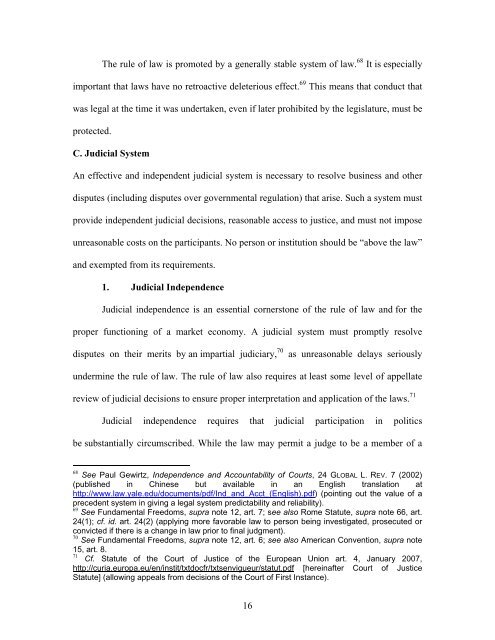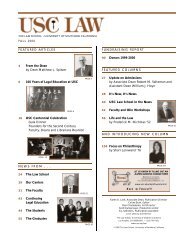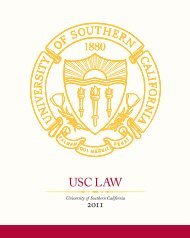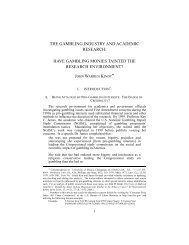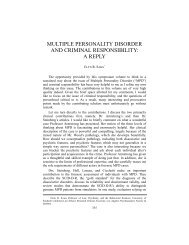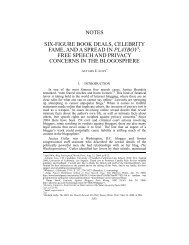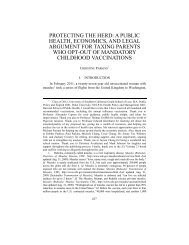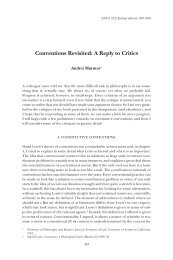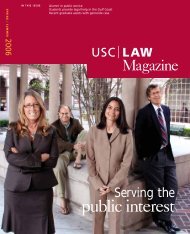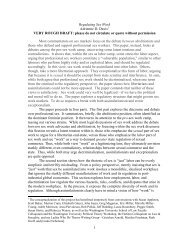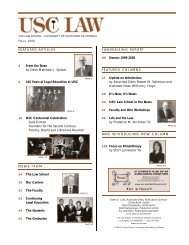Bufford Defining the Rule of Law
Bufford Defining the Rule of Law
Bufford Defining the Rule of Law
Create successful ePaper yourself
Turn your PDF publications into a flip-book with our unique Google optimized e-Paper software.
The rule <strong>of</strong> law is promoted by a generally stable system <strong>of</strong> law. 68 It is especially<br />
important that laws have no retroactive deleterious effect. 69 This means that conduct that<br />
was legal at <strong>the</strong> time it was undertaken, even if later prohibited by <strong>the</strong> legislature, must be<br />
protected.<br />
C. Judicial System<br />
An effective and independent judicial system is necessary to resolve business and o<strong>the</strong>r<br />
disputes (including disputes over governmental regulation) that arise. Such a system must<br />
provide independent judicial decisions, reasonable access to justice, and must not impose<br />
unreasonable costs on <strong>the</strong> participants. No person or institution should be “above <strong>the</strong> law”<br />
and exempted from its requirements.<br />
1. Judicial Independence<br />
Judicial independence is an essential cornerstone <strong>of</strong> <strong>the</strong> rule <strong>of</strong> law and for <strong>the</strong><br />
proper functioning <strong>of</strong> a market economy. A judicial system must promptly resolve<br />
disputes on <strong>the</strong>ir merits by an impartial judiciary, 70 as unreasonable delays seriously<br />
undermine <strong>the</strong> rule <strong>of</strong> law. The rule <strong>of</strong> law also requires at least some level <strong>of</strong> appellate<br />
review <strong>of</strong> judicial decisions to ensure proper interpretation and application <strong>of</strong> <strong>the</strong> laws. 71<br />
Judicial independence requires that judicial participation in politics<br />
be substantially circumscribed. While <strong>the</strong> law may permit a judge to be a member <strong>of</strong> a<br />
68<br />
See Paul Gewirtz, Independence and Accountability <strong>of</strong> Courts, 24 GLOBAL L. REV. 7 (2002)<br />
(published in Chinese but available in an English translation at<br />
http://www.law.yale.edu/documents/pdf/Ind_and_Acct_(English).pdf) (pointing out <strong>the</strong> value <strong>of</strong> a<br />
precedent system in giving a legal system predictability and reliability).<br />
69<br />
See Fundamental Freedoms, supra note 12, art. 7; see also Rome Statute, supra note 66, art.<br />
24(1); cf. id. art. 24(2) (applying more favorable law to person being investigated, prosecuted or<br />
convicted if <strong>the</strong>re is a change in law prior to final judgment).<br />
70<br />
See Fundamental Freedoms, supra note 12, art. 6; see also American Convention, supra note<br />
15, art. 8.<br />
71<br />
Cf. Statute <strong>of</strong> <strong>the</strong> Court <strong>of</strong> Justice <strong>of</strong> <strong>the</strong> European Union art. 4, January 2007,<br />
http://curia.europa.eu/en/instit/txtdocfr/txtsenvigueur/statut.pdf [hereinafter Court <strong>of</strong> Justice<br />
Statute] (allowing appeals from decisions <strong>of</strong> <strong>the</strong> Court <strong>of</strong> First Instance).<br />
16


